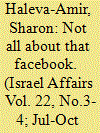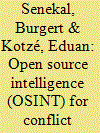| Srl | Item |
| 1 |
ID:
174685


|
|
|
|
|
| Summary/Abstract |
False claims and misinformation spread in Africa not only on Facebook, in WhatsApp groups or on the dark web, but also in political meeting rooms, churches, mosques, and community gatherings. To reduce the harms caused by misinformation, Africa Check, the leading independent fact‐checking organisation on the continent, believes a four‐pronged, or holistic approach is needed: identifying and reducing the circulation of harmful misinformation; ensuring accurate information is more widely available; ensuring a more accurate understanding of topics it covers; and fostering fact‐checking skills among the public. To achieve this, it reaches out and engages with a wide range of on‐ and offline communities and networks. The UK could learn from this approach to tackle the ways that misinformation continues to spread offline today.
|
|
|
|
|
|
|
|
|
|
|
|
|
|
|
|
| 2 |
ID:
149191


|
|
|
|
|
| Summary/Abstract |
Only 26 months separate the elections for the 19th Knesset (January 2013) from those for the 20th (March 2015), yet the digital campaigns employed in the latter demonstrate interesting shifts. Using empirical data collected from social network sites and from journalistic campaign coverage, this article analyses the use of the online sphere by parties, candidates and audiences, identifying evolving shifts in digital campaigning. The findings point out the reoccurrence of some trends, whether intensified or otherwise, as well as the emergence of new trends that illustrate the evolution of Israeli online campaigning. The prominent recurring trends are (1) personal politics; (2) professionalized campaigns; (3) alternative funding models; (4) social activism; and (5) constant violation of election law provisions. The new trends include: (1) Facebook’s alternatives; and (2) assimilation of web culture into the campaigns. Analysing the findings suggests that current campaigns focus on entertainment rather than on real discourse and stress the obsolescence of the current legal regime
|
|
|
|
|
|
|
|
|
|
|
|
|
|
|
|
| 3 |
ID:
168434


|
|
|
|
|
| Summary/Abstract |
With the advent of the information age, Open Source Intelligence (OSINT) has gained special prominence in the Intelligence Community (IC). However, the era of big data has brought numerous challenges in handling OSINT, in particular because big data comprise large volumes of unstructured data that are generated continuously. In this article, we discuss the use of OSINT in the era of big data, in particular how it relates to compiling event data, but also show that large projects with an international focus such as the Integrated Crisis Early Warning System (ICEWS) are inadequate to study political instability in the current South African context. We shift our collection efforts from mainstream media to the analysis of WhatsApp messages, since this platform has recently gained popularity and it is widely used in South Africa. We show how we build an automated data pipeline that provides near real time data on the occurrence of mass violence in South Africa. For this analysis, we make use of Natural Language Processing (NLP) toolkits in Python and build interactive dashboards to monitor the state of mass violence in South Africa.
|
|
|
|
|
|
|
|
|
|
|
|
|
|
|
|